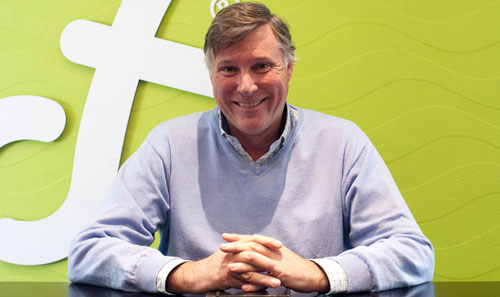
Vox Telecom group MD Doug Reed is no stranger to the vagaries of the local telecommunications industry. The 52-year-old has made — and lost — a personal fortune in his career, but is warm and welcoming when I meet him at the company’s offices across the highway from Melrose Arch in Johannesburg.
Tall, with a confident gait and a firm handshake, Reed didn’t start out in the technology industry but, rather, in hardware — of the spades and shovels variety.
Reed joined Datapro — the genesis of Vox Telecom — in September 1997, when he was brought in by its then controlling shareholder, Control Instruments, to turn it into an Internet service provider. Management later bought the company.
Reed says Vox was “lucky that telecoms regulations were prehistoric at the time, because it provided an opportunity in that it scared away [big players]. Of course, it hindered us, too, but it allowed us to get to the right economies of scale before major opposition arrived in the market.”
But the company has been through tough times in recent years. Its share price is languishing at around 36c/share as analysts fret that market pressures and regulatory changes are taking their toll. “We made some mistakes and a couple of acquisitions too many,” Reed says.
“Most of our acquisitions and investments have added huge value, but one in particular set us back drastically: it wiped out the staff shareholding. We’ve only got ourselves to blame for that.”
Vox invested heavily in single-stock futures via the now-defunct derivatives trader Dealstream and had to write off R61m in the process. Reed, Vox directors and employees lost a further R89m when Dealstream collapsed.
Having lost his personal fortune, Reed says he had two choices. “I could resign, or do something about it. I kept the team intact and tried to restore the company’s value to what it should be in a recessionary and difficult, deflationary, liberalising market.”
But Reed says the tough conditions energise him. “It sorts the men from boys.”
In recent years, the company has changed its approach. “In 2009 and 2010 we were very inwardly focused, making sure we improved efficiencies, got the balance sheet strong again, and all the money we lost we made back,” he says. “We decided to get the financials and balance sheet healthy and upgraded our networks.”
Reed says it’s bearing fruit, although the share price remains depressed. “By the end of the year we’ll be back to our old growth and plan to be an industry disrupter where we can. This is a good time to do business, but a tough one.”
It will be “another couple of years of refining our strategy before we’ll be satisfied with where we want to be”, he adds. “We’re going through this difficult economy with massive deflation. I don’t think many industries would cope with deflation like we do.”
 Reed says a different set of rules applies in a deflationary environment and that an elastic demand curve results in prices dropping and demand soaring. He says that the regulatory environment today is far more favourable for consumers and, ultimately, for businesses. “Sure, there’s short-term pain, but it evens the playing field a bit.”
Reed says a different set of rules applies in a deflationary environment and that an elastic demand curve results in prices dropping and demand soaring. He says that the regulatory environment today is far more favourable for consumers and, ultimately, for businesses. “Sure, there’s short-term pain, but it evens the playing field a bit.”
The next three years will be “severely testing”, he says. “Prices are coming down radically, the value chain is getting eroded, and competition is increasing, all of which is good for the country and the consumer. But it’s a difficult environment to navigate. We’re trying to look at it as an advantage, if we navigate better than the opposition we’ll come out far stronger for it.”
He says the company plans to expand its converged solutions offerings to the corporate market and in the consumer space it is aiming for average revenue per user “north of R300, from the current R100”.
“There are exciting developments ahead that I can’t go into too much. But I can say that it’s nice to get things right in a tough climate.”
Reed says that before joining Datapro, he wasn’t a career person in that he’d “never really worked for anybody else or gone to job interviews”.
“I did the first year of a BCom, then I worked on oil rigs overseas, which allowed me to see Europe and to come back to SA with a bit of money,” he says. “I invested in my father’s hardware store in Sandton by buying out his partner. When we sold that I then messed about with publishing and other businesses.”
He then decided he wanted to get involved in the fledgling Internet industry. “I had always used computers and our hardware store was first in the region to computerise. Computers weren’t a hobby, though. Mica [the hardware retail chain] asked me to set up a distribution centre for them over a few months. Six months became years.”
Soon after turning 37, Reed says he “got a rude awakening”. “I was nearly 40 and realised I’d wasted years working for other people. I pretended I was 16 and wrote down two pages of things I’d like to be. One of the things that came up was running a national, annuity-based Internet business, a business that wasn’t defined by four walls and that didn’t require dealing with general labour. A couple of weeks later, the Control Instruments offer came out of the blue.”
Most people thought he was “insane” to take the job. “I made the move from physical to virtual products. People tend to treat IT businesses as far more complicated than they are. Like other businesses, they’re about buying, selling, trading and customer relations.”
Reed says there are two ways of getting wealthy. “You can create wealth or you can compete for it. I’m better at creating than competing, which is why I’m not great at the stock market or gambling or the like. I would rather produce a new product to increase turnover than steal customers. That’s just my personal preference and strength.”
Reed is fiercely family-orientated and his family tries to spend a lot of quality time together. A typical “armchair sportsman”, particularly when it comes to rugby and cricket, he also enjoys wildlife photography. “I play a bit of squash and I go to gym, nothing too serious.”
Vox Telecom is known for frequent mountaineering expeditions, led by former CEO Tony van Marken. Reed describes the time he climbed Mont Blanc in the French Alps as one of the “most relaxing holidays because I was so focused on trying to stay alive”.
“I didn’t get to the top because we ran out of time but it was still a fantastic trip.” — Craig Wilson, TechCentral
- Subscribe to our free daily newsletter
- Follow us on Twitter or on Facebook




